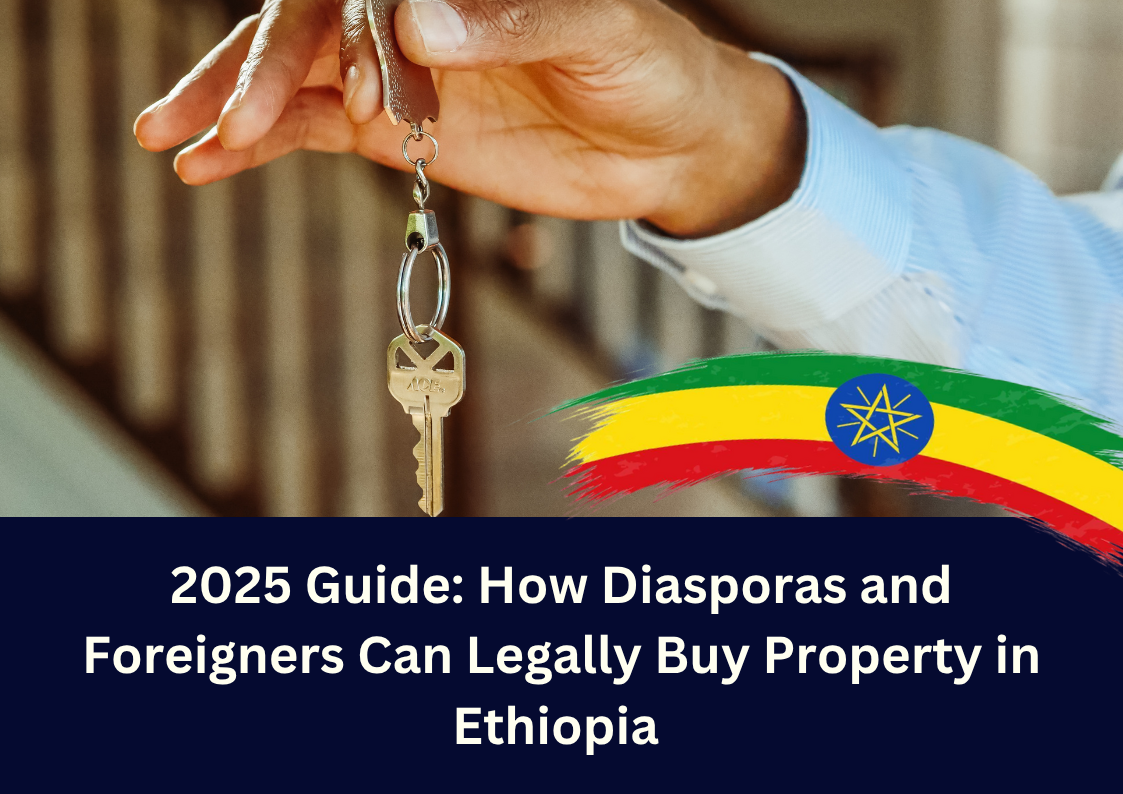Are you a member of the Ethiopian diaspora, a foreign investor, or a local buyer interested in Ethiopia’s booming real estate market? This guide is for you.
With Ethiopia’s property market now valued at over $1.15 trillion USD and recent legal reforms opening doors to foreign ownership, 2025 marks a historic opportunity to invest in one of Africa’s fastest-growing real estate landscapes.
Whether you're planning to buy a home, an investment property, or land for development, this step-by-step guide will walk you through the process, legal requirements, and hidden pitfalls to avoid.
🌍 Ethiopia’s Property Market in 2025: Big, Fast-Growing, and Ready for Investment
The Ethiopian real estate sector is expanding at an annual rate of 6–10%, fueled by:
- Rapid urbanization
- A rising middle class
- Government reforms and foreign investor interest
- Strong demand for housing in Addis Ababa and major cities
In prime areas, rental yields are averaging 7–10%, making real estate one of Ethiopia’s most attractive investment vehicles.
✅ Can Foreigners Buy Property in Ethiopia in 2025?
Yes. Thanks to new legislation, foreigners and diaspora Ethiopians are now legally permitted to purchase residential or commercial property in Ethiopia—under specific conditions.
🏛 Key Legal Highlights
- Minimum investment: $150,000 USD per property
- Maximum ownership: 5 properties per individual/entity
- Land ownership: Still not allowed (land is government-owned)
- Mortgage access: Foreigners cannot access local loans
- PPP Projects: Foreigners can invest in for-profit housing developments via Public-Private Partnerships
🔗 Read the full breakdown of Ethiopia’s new homeownership law for foreigners
🧭 Step-by-Step Guide to Buying Property in Ethiopia
Here’s what the typical process looks like for diaspora or foreign buyers:
1. Property Search & Viewing
Find a property with the help of a licensed agent. Start browsing verified homes, land, and new developments here.
2. Make an Offer
Once you find the right fit, your agent will submit a formal offer to the seller outlining the price and payment terms.
3. Preliminary Agreement (Mender Wul)
Secure the deal with a 10% deposit. This is a non-binding agreement that signals serious intent.
4. Final Sale Agreement & Title Transfer
Once due diligence is complete, both parties sign the final contract at DARA (Document Authentication and Registration Agency).
5. Registration and Completion
You’ll pay stamp duty (6%) and officially register the property at the local land office, where the title deed is transferred to your name.
💡 Overseas buyer? You can complete the purchase legally via a notarized Power of Attorney.
📄 Requirements for Foreign Buyers
- Valid passport & visa
- Bank statements
- Marital status certificate
- Passport-sized photos
- Formal bank transfer (no cash deals)
- $150,000 USD+ investment
Explore available houses for sale or land listings that meet the legal criteria.
⚖️ Understanding Contracts & Sale Agreements in Ethiopia
In Ethiopia, there are typically two stages to a property deal:
- Mender Wul (Preliminary Agreement)
- This is not legally binding but shows intent to buy.
- DARA Agreement (Final Sale Contract)
- A legally binding contract prepared and registered by officials. Once this is signed, the balance payment is made and ownership is transferred.
For off-plan properties, payments are made in phases—starting with a deposit, then structured installments until completion.
🔍 Due Diligence and Mortgage Process
Before signing anything, you must:
✅ Verify the title deed at the sub-city land office
✅ Confirm no encumbrances or debts
✅ Ensure the seller's marital status is disclosed
✅ Check zoning and land use legality
✅ Avoid condominium/public housing projects as a foreigner
✅ Conduct a land survey (especially for bare plots)
Looking to calculate affordability? Use our mortgage and investment calculator to estimate your returns.
💸 Transaction Costs: What You’ll Pay
Here’s a breakdown of typical transaction expenses:
CostAmountStamp Duty6% of property valueAgent Fees~2% commissionLegal FeesVaries by caseRegistration & DocsTitle search, notarization, etc.Mortgage Fees (if diaspora)Bank charges, appraisal, etc.
🚨 Common Pitfalls to Avoid
Many buyers lose money or face legal issues due to avoidable mistakes. Here are the top ones:
- Not verifying the title deed
- Using unlicensed brokers
- Skipping legal review
- Underestimating costs
- Falling for scam projects with unrealistic promises
🏠 Why Work With Live Ethio?
At Live Ethio, we specialize in helping diaspora and foreign buyers navigate the Ethiopian property market confidently and legally.
We offer:
- Verified properties (residential, land, commercial)
- Legal advisory and due diligence
- Representation via Power of Attorney
- Design, build, and investment services
Book your free consultation or browse available listings at livingethio.com.
📞 Ready to Buy? Let’s Get Started
Whether you're abroad or in Ethiopia, our expert team can help you every step of the way—from property search to legal transfer.
📍 Visit us: Level 11, Merkeb Plaza, Bole Dembel, Addis Ababa
📞 Call/WhatsApp: +251 947 00 22 33 | +251 974 29 94 72
📧 Email: contact@livingethio.com
🌐 Explore listings & tools: https://livingethio.com/
Own a piece of Ethiopia’s future—invest wisely with Live Ethio.
